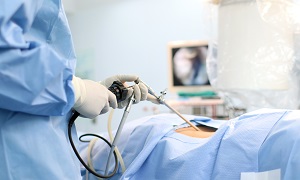Best Doctors in India for J-Pouch Surgery
Best Hospitals in India for J-Pouch Surgery
- City: Mumbai, India
Hospital Highlights:
- Fortis Hiranandani hospital was established in 2007.
- The hospital is an advanced tertiary care, multi-specialty hospital equipped with 149 beds.
- The hospital is equipped with a super ICU to provide emergency medical care to critically ill patients.
- The hospital is NABH accredited.
- The critical care facility in the hospital is augmented with the state-of-the-art facilities that facilitate speedier diagnosis and efficient monitoring.
- The hospital provides specialty medical services in cardiology, orthopedic science, pediatric science, neurology, diabetic care, urology, nephrology, ENT, obstetrics, gynecology, cosmetic surgery, bariatric surgery, neuro and spine care.
- City: Gurugram, India
Hospital Highlights:
- W Pratiksha Hospital, Gurugram, is one of the best hospitals in the NCR region. It is also a top hospital in India for IVF. Since its inception, the hospital has performed over 5500 successful IVFs. The hospital also specializes in gynecology.
- With over 20 years of experience in providing quality healthcare, the hospital is known as one of the most trusted and valued health providers in India.
- Equipped with world-class medical facilities and advanced technology, the hospital’s doctors and clinicians also have a track record of delivering excellent results. The hospital is also known for focusing on preventive well-being as much as on curative treatment.
- The hospital has earned the trust of its patients, by providing the best available treatments at affordable costs.
- City: Gurugram, India
Hospital Highlights:
- Paras hospital was established in 2006 and is the 250 bedded flagship hospital of Paras Healthcare.
- The is supported by a team of doctors of international and national repute.
- The hospital is NABH accredited and also the first hospital in the region to have a NABL accredited laboratory.
- The hospital provides specialty medical services in around 55 departments including Neurosciences, Joint Replacement, Mother & Child Care, Minimal Invasive Surgery, Gynecology and Obstetrics, Ophthalmology, Dermatology, Endocrinology, Rheumatology, Cosmetic and Plastic surgery.
- The hospital is equipped with state-of-the-art technologies.
- City: Kolkata, India
Hospital Highlights:
- Fortis Hospital, Anandapur, Kolkata is a world-class super-speciality equipped with the latest technologies in the medical world.
- The hospital is NABH accredited.
- This state-of-the-art facility specializes in cardiology and cardiac surgery, urology, nephrology, neurosciences, orthopaedics, digestive care, emergency care and critical care.
- The hospital, governed by integrated Building Management System (IBMS), has a pneumatic chute system, for quick vertical and horizontal transportation between floors, facilitating speedy transfer of patient specimens, documents, reports, and medicines to the concerned departments.
- The hospital also has a nephrology department with over 28 advanced dialysis units.
- City: Mumbai, India
Hospital Highlights:
- SL Raheja hospital is a 140-bed multi-specialty tertiary care hospital that is being managed by Fortis Healthcare Ltd.
- The hospital is a benchmark in healthcare and medical facilities in the neighborhood of Mahim & the western suburbs.
- L.Raheja Hospital, Mahim has one of the most effective ICU and Casualty care services.
- The hospital provides specialty medical services in Cardiology, Oncology, Neurology, Orthopedics, Mother & Child Care, and in Diabetes.
- City: Mumbai, India
Hospital Highlights:
- Wockhardt Hospitals were established in the year 1973, originally called First Hospitals and Heart Institute.
- Wockhardt Hospitals are super specialty health care networks in India, nurtured by Wockhardt Ltd, India’s 5th largest Pharmaceutical and Healthcare company.
- Wockhardt Hospitals is associated with Partners Harvard Medical International, an international arm of Harvard Medical School, USA.
- Wockhardt Heart Hospital performed India’s first endoscopic heart surgery.
- The hospital has a state-of-the-art infrastructure equipped with the latest technologies and modern equipment.
- It has special Centers of Excellence dedicated to the major specialties to provide hassle-free and high-quality clinical care.
- City: Gurugram, India
Hospital Highlights:
- The CK Birla Hospital in Gurugram is a NABH-accredited multi-specialty hospital.
- The hospital strives to increase the quality of healthcare by focusing on UK NHS nurse and midwife training requirements. Policies and practices derived from the National Institute for Health and Treatment Excellence (NICE) recommendations in the United Kingdom ensuring that a strong focus on safety, high-quality clinical care, and sanitation is maintained.
- The hospital’s cutting-edge technology and facilities allow for real-time communication and seamless collaboration among caregivers, ensuring accuracy and the best possible results. Those with foreign experience and accreditations make up part of the hospital’s team of clinicians.
- City: Ahmedabad
Hospital Highlights:
- As a member of the Apollo Hospitals Group, Apollo Hospitals International Limited, Ahmedabad is one of the most popular and sought-after medical facilities in Gujarat.
- Through its 6 Centres of Excellence and various affiliated branches, which cover all specialties and subspecialties, the hospital provides the most advanced clinical services.
- Since its inception in 2003, the hospital has been providing each patient with the most up-to-date medical equipment and state-of-the-art technology.
- With more than 150 successful organ transplants, including liver and renal transplants, the facility has been able to build a strong and extensive organ transplant program.
- In addition to performing 600 surgeries and caring for over 1800 patients on an IP basis, the hospital sees more than 18,000 patients on average in the outpatient department.
- With one of the biggest cardiology teams in the area, the hospital provides state-of-the-art regional care treatment in Cardiac Sciences.
- Additionally, the hospital offers a broad range of Neuro Interventional techniques to help stroke patients recover more quickly.
- City: Noida, India
Hospital Highlights:
- Jaypee Hospital is the flagship hospital of the Jaypee Group.
- This hospital has commissioned 525 beds in the first phase and has been planned and designed as a 1200 bedded multi-specialty facility.
- It holds the accreditation of the NABH and NABL.
- The hospital has state-of-the-art infrastructure equipped with the latest technologies and modern equipment like 64 Slice PET CT, Dual Head 6 Slice SPECT CT, Gamma Camera, and Da Vinci Robotic Surgery for comprehensive robotic surgical solutions.
- It has special Centers dedicated to the major specialties to provide hassle-free and high-quality clinical care.
- City: Mumbai, India
Hospital Highlights:
- Reliance Hospital is one of the best super-specialty care hospitals in Navi Mumbai.
- The main purpose of this hospital is to become a trustworthy place for the best health and hope for society. The hospital is well connected to the suburbs of Mumbai and Navi Mumbai.
- The hospital has various specialty departments, viz., Accident & Emergency, Anesthesiology, Dental Services, Dermatology, Diabetology, Dietetics Nutrition, Endocrinology, ENT, Gastroenterology, General Surgery, Gynaecology And Obstetrics, Hepato Pancreato Biliary Surgery, Infectious Disease, Internal Medicine, Interventional Radiology, Laboratory Medicine, Minimal Access Laparoscopic Surgery, Nephrology, Neurosciences, Opthalmology, Orthopaedics, Paediatrics, Pain Management Palliative Care, Physical Medicine Rehabilitation, Plastic And Reconstructive Surgery, Psychiatry, Pulmonary Medicine, Radiology, Rheumatology, Transplant, Urology Andrology, Vascular Surgery
J-Pouch Surgery
Ileonala anastomosis surgery, which is commonly termed as a J-pouch surgery allows you to eliminate waste material normally after your entire large intestine is removed. The procedure involves constructing a J-pouch after your surgeon removes your colon and rectum.
This procedure avoids the need for a permanent opening in the abdomen i.e. stoma for passing any bowel movements.
Purpose
J-Pouch surgery is generally used for treating chronic ulcerative colitis and inherited conditions, like familial adenomatous polyposis, which carries a high risk of colon and rectal cancer.
In some instances, the procedure might be done when medications for treating ulcerative colitis are not successful in controlling the condition. It might also be done if precancerous changes or colon cancer is detected. The surgery is also used for treating colon cancer and rectal cancer.
Preparation
Before the procedure, you should talk with your doctor if you use alcohol, tobacco any other drugs, as these can affect your healing and recovery.
Your healthcare team will examine you before your surgery to mark the ileostomy site. Several factors can affect ileostomy site selection, which includes your natural skin folds, scars, navel, muscles in your abdomen, waistline, hip bone and visibility of the site when you are sitting. It is important to select the location properly so that you can care for the ileostomy after your surgery.
Procedure
During the procedure
J-pouch surgery is generally performed using minimally invasive (laparoscopic) methods. Instead of opening your abdomen with a relatively large incision (open surgery), surgeons usually prefer to create more than one smaller abdominal incision through which surgical instruments can be inserted. Next, your surgeon will also be inserting a laparoscope, which is a long, narrow tube with a camera at the tip.
During the surgery, first, the surgeon will remove your entire colon and rectum, preserving the muscles, sphincter and opening the anus at the end of your rectum.
Then he/she will construct a pouch-shaped like the letter J from the end of the small intestine. It will be attached to the opening at the end of the rectum. Next, for the elimination of waste, a temporary opening will be constructed in the abdominal wall, which is known as an ileostomy.
After around three months of healing, another procedure will be performed by your surgeon for closing the ileostomy, which will allow you to pass stool normally.
After the procedure
You will need to spend a little time in the hospital recovering as well as learning how to care for your ileostomy. You will likely receive pain medication or antibiotics as well.
Your doctor may recommend you to drink lots of fluids, which can be water or electrolyte replacement drinks, for avoiding dehydration as well as the loss of electrolytes. For around six to eight weeks, you will have to avoid certain kinds of foods, which can include raw fruits and vegetables, nuts, popcorn or any such food high in roughage. These kinds of foods can cause irritation in the anal area. If your stool is watery, then it is recommended that you eat certain kinds of foods such as rice, bananas or peanut butter.
For around four to six weeks after the surgery, try to avoid lifting or any kind of strenuous activity.
Results
For the majority of people, children and adults alike, they can see an improvement in their quality of life, after the surgery. However, people who are over 45 years of age might experience more incontinence and may need to go to the bathroom more frequently at night. On average, most of the people who undergo this procedure generally have around six bowel movements a day and one at night. It is estimated that around 90 percent of people who undergo this surgery, can be satisfied with the results.
Though this surgery can’t affect a woman’s ability to have a regular pregnancy and delivery, it might sometimes affect fertility.
Risks and complications
Though J-Pouch surgery is generally successful in treating your ulcerative colitis, sometimes there might be few complications that can require follow-up treatment. If you experience any of these conditions, inform your doctor immediately-
Pouchitis: Inflammation of the pouch can be considered the most common complication of j-pouch surgery and it is known to occur in around 50 percent of patients. It should occur within the first two years and is treatable with antibiotics. Diarrhea, fever, crampy abdominal pain, increased stool frequency, joint pain, and dehydration are the symptoms of this complication.
Small Bowel Obstruction: This is less common, but it can develop due to adhesions, which are fibrous bands that can occur between tissue and organs after your surgery. Around two-thirds of people who develop a small bowel obstruction should be able to be treated with bowel rest, such as not taking food for a few days. However, others might require surgery for removing the blockage. Symptoms of this complication include crampy abdominal pain, inability to pass stool, vomiting, and nausea.
There are few other possible conditions that might also develop post-surgery, which include pelvic abscesses and pouch fistulas.
Pouch failure, which generally occurs only in a tiny percentage of patients, requires surgery for removing the pouch and to create a permanent ileostomy.













